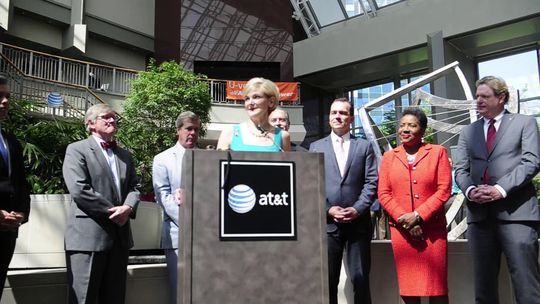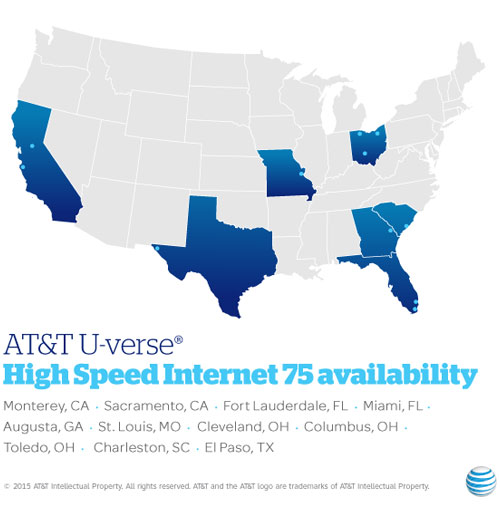
In Search Of… AT&T U-verse with GigaPower
AT&T’s gigabit broadband project has appeared in the greater Nashville area, but Stop the Cap! volunteers in the country music capital report you have a better chance getting struck by lightning than finding the service available to your home or business.
AT&T officially unveiled the upgrade in “parts of Clarksville, Lebanon, Murfreesboro, Nashville, Smyrna and surrounding communities located throughout the metro area,” but quickly warned with three asterisks the service was “not available in all areas.”
“That is the understatement of the year,” said Nashville resident Chris Jensen who can’t wait to ditch Comcast for 15 years of bad service and billing errors. “Unless you live in an upscale apartment complex, a new housing development, Walmart or have a country album on the charts you are probably going to be stuck with traditional U-verse speeds from AT&T.”
Jensen is part of Stop the Cap!’s In Search Of… AT&T GigaPower, our new project using volunteers to pelt AT&T’s qualification tool with addresses (and follow-up phone calls) looking for AT&T’s elusive gigabit speeds in the cities where the service has been introduced.
“Forget it Nashville, it’s another AT&T fiber to the press release and payback to the very friendly state politicians that rubber stamp AT&T’s agenda,” said Jensen.
Despite GigaPower’s rarity, AT&T is the first company to bring gigabit speeds to the Nashville residential market.

AT&T Tennessee president Joelle Phillips is surrounded by AT&T’s political friends from around the state. (Photo: The Tennessean)
Joelle Phillips, president of AT&T Tennessee, used a news release to share the company’s spotlight with a number of local and state politicians identified as supporters of AT&T’s public policy advocacy effort, which includes deregulating AT&T’s business in the state and attempting to keep restrictions on the books to block competing public broadband network expansion in Tennessee.
“We were able to deploy network enhancements fast – in less than a year since we announced our U-verse with AT&T GigaPower plans for Nashville,” said Phillips. “Smart, pro-investment policies, championed at the state level by Governor Haslam and legislative leaders like Speaker Harwell and Lt. Governor Ramsey – as well as streamlined local permitting processes that Mayor Dean and our Metro Council members have embraced – were key in speeding our work.”
Nonsense, says Jensen.
“Tennessee is about as friendly a state AT&T can find — our legislature allows AT&T to basically write its own pieces of legislation, yet the fastest way to get gigabit speeds is to move to Chattanooga where EPB is providing the service without asking to gut consumer protection laws or wait for AT&T to get around to bringing faster service to your home,” said Jensen.
Critics contend AT&T maintains ties with state and local politicians that are too close for comfort, potentially hurting consumers in Tennessee.
 According to the National Institute of Money in Politics, telecommunications industry interests wrote at least $643,000 in campaign contribution checks to Tennessee politicians during the two-year 2014 election cycle. AT&T alone put $211,000 into the pockets of legislators. The Tennessee Registry of Election Finance reports AT&T contributed $20,000 during the last election cycle to Republican Lt. Gov. Ron Ramsey’s leadership political action committee, RAAMPAC. AT&T President Joelle Phillips personally gave another $2,000.
According to the National Institute of Money in Politics, telecommunications industry interests wrote at least $643,000 in campaign contribution checks to Tennessee politicians during the two-year 2014 election cycle. AT&T alone put $211,000 into the pockets of legislators. The Tennessee Registry of Election Finance reports AT&T contributed $20,000 during the last election cycle to Republican Lt. Gov. Ron Ramsey’s leadership political action committee, RAAMPAC. AT&T President Joelle Phillips personally gave another $2,000.
House Speaker Beth Harwell benefited from at least $17,000 in AT&T money over the last two years. AT&T spends another $1.3 million on as many as 13 full time lobbyists that devote all of their attention to Tennessee.
Gov. Bill Haslam doesn’t really need AT&T’s money. He is now worth an estimated $2 billion, making him the richest elected official in the country, according to an analysis by Forbes.
In return for this largesse, AT&T is routinely praised by all three state officials, which is returned when AT&T sends out press releases gushing over Tennessee’s ‘AT&T-Friendly’ deregulation policies.
AT&T will charge a range of prices for U-verse GigaPower service in Nashville, which all include AT&T’s right-to-spy on your browsing behavior. If you want to opt out of AT&T’s “Internet Preferences” customer monitoring program, add $29 a month to these prices:
- U-verse High Speed Internet Premier: Internet speeds up to 1Gbps starting at $120 a month, or speeds at 100Mbps as low as $90 a month, with one-year contract required;
- U-verse High Speed Internet Premier + TV: Internet speeds up to 1Gbps and qualifying TV service starting at $150 a month, or speeds at 100Mbps and qualifying TV service as low as $120 a month, with a one year contract;
- U-verse High Speed Internet Premier + TV + Voice: Internet speeds up to 1Gbps with qualifying TV service and Unlimited U-verse Voice starting at $180 a month, or speeds at 100Mbps with qualifying TV service and Unlimited U-verse Voice as low as $150 a month, with a two-year term commitment.
AT&T imposes a 1TB monthly usage cap on its gigabit broadband service. Overlimit fees of $10 per 50GB will apply to customers exceeding that usage allowance.


 Subscribe
Subscribe The Cable Show (now known as INTX) is often used by the cable industry to announce and preview new products and services, and at this year’s convention in Chicago, Comcast CEO Brian Roberts used the occasion to introduce the company’s new DOCSIS 3.1 multi-purpose Home Gateway capable of delivering gigabit speeds over its existing hybrid fiber-coax network.
The Cable Show (now known as INTX) is often used by the cable industry to announce and preview new products and services, and at this year’s convention in Chicago, Comcast CEO Brian Roberts used the occasion to introduce the company’s new DOCSIS 3.1 multi-purpose Home Gateway capable of delivering gigabit speeds over its existing hybrid fiber-coax network. Cox Communications has raised Internet speeds for its economy class customers in Arizona as it continues network enhancements across the state.
Cox Communications has raised Internet speeds for its economy class customers in Arizona as it continues network enhancements across the state.
 Welcome to the 2015 Time Warner Cable Winter Policy Conference, held Jan 22-23 at the remodeled resort and spa where a stay during the summer can cost $500 a day.
Welcome to the 2015 Time Warner Cable Winter Policy Conference, held Jan 22-23 at the remodeled resort and spa where a stay during the summer can cost $500 a day. The thought of competition is enough to give any cable lobbyist indigestion, especially if the new entrant provides fiber to the home service, something almost unknown among commercial providers in Maine.
The thought of competition is enough to give any cable lobbyist indigestion, especially if the new entrant provides fiber to the home service, something almost unknown among commercial providers in Maine. “If we want good public policy, there’s reason for all of us to be worried,” utilities expert Gordon Weil, the state’s first Public Advocate, who represented the interests of ratepayers before regulators, told the Maine Center for Public Integrity. Such treatment of legislators is “obviously intended to persuade them by more than the validity of the arguments; it’s intended to persuade by the reception they’re given.”
“If we want good public policy, there’s reason for all of us to be worried,” utilities expert Gordon Weil, the state’s first Public Advocate, who represented the interests of ratepayers before regulators, told the Maine Center for Public Integrity. Such treatment of legislators is “obviously intended to persuade them by more than the validity of the arguments; it’s intended to persuade by the reception they’re given.” Scott Pryzwansky, Time Warner Cable’s director of public relations for the eastern U.S., declined to answer any specific questions but replied by email: “As one of Maine’s leading employers and telecommunications companies, we designed this second biannual educational forum to help policymakers and others better understand some of the complex telecommunications issues confronting Maine and the nation.”
Scott Pryzwansky, Time Warner Cable’s director of public relations for the eastern U.S., declined to answer any specific questions but replied by email: “As one of Maine’s leading employers and telecommunications companies, we designed this second biannual educational forum to help policymakers and others better understand some of the complex telecommunications issues confronting Maine and the nation.” A highly slanted (
A highly slanted ( AT&T Speed Increases to the Press Release are back, and an AT&T installer in Cleveland tells us you probably don’t qualify to get them just yet.
AT&T Speed Increases to the Press Release are back, and an AT&T installer in Cleveland tells us you probably don’t qualify to get them just yet.